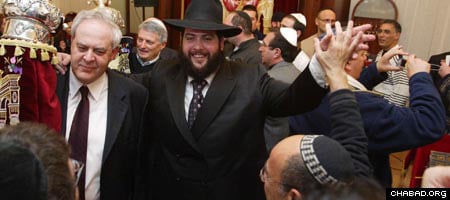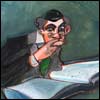Miklos Foldi waited his whole life to embrace his Jewish identity. He got his chance in the most unlikeliest of places: Hungary's Sziget Festival, an annual music and cultural extravaganza that draws an estimated 400,000 people.
According to Foldi, whose mother lived through the Holocaust and then Communist domination, it was then that a group of Chabad-Lubavitch rabbis gave him the opportunity to put on tefillin.
"My mother did not want that I should have a Jewish identity," said Foldi, a 29-year-old psychologist and resident of Budapest. "She told me that it was very dangerous [to be a Jew], that it is better for me to not be Jewish, better to be an atheist."
But despite Foldi's parents forbidding him to explore his Jewish roots, an urge to be a part of the Jewish nation never left his mind. At Sziget, his only knowledge of tefillin was that he saw an actor don the prayer-boxes in a movie, but today, he attends classes at the Open University of Judaic Studies in Hungary, a project of Lubavitch of Hungary and directed by Rabbi Shlomo Koves.
His parents are also learning that to be a Jew in Budapest isn't a dangerous proposition anymore.
Said Foldi: "I am very happy that I continued the search in my heart for the place in Judaism."
Bursting at the Seams

In the same building that the Open University calls home sits the Keren-Or Chabad Israeli Center, the only synagogue in Budapest's famed downtown Fifth District, which borders the Danube River separating the city in two. The synagogue, directed by Rabbi Shmuel and Dvorah Leah Raskin, is the city's only Jewish house of worship built after the Holocaust and reportedly has the country-wide honor of owning the most Torahs – six – written after World War II.
"It's always a full house," said Gabor Redey, a young Jew who lives in Budapest, pointing out that the current location frequently prevents more than one program from running at the same time. Attendees often have to wait for one program to finish before the other one can begin.
According to Redey, Koves, the program director of Lubavitch of Hungary, "is a very good guy. He is young and friendly. He is very religious, but still he is a good friend."
"The Chabad community is growing all the time," continued Redey, adding that competition with other Jewish institutions is rare in a city where 95 percent of the Jewish community is unaffiliated. "The younger Jews want more, and are coming to Chabad."
Batsheva Oberlander, who has co-directed Chabad's operations in Budapest since arriving in 1989, explained that Keren-Or's bursting at the seems is only the continuation of the exponential growth that gave birth to the synagogue.
"What happened was that the Chevra Shas Lubavitch, called by locals the Vasvari Synagogue, was too full," said Oberlander. "Now the synagogue in the Fifth District is overflowing and they had to make High Holiday Services in another building.
"The Vasvari Synagogue is also still overflowing with Hungarian Jews," she added.
In an event attended by Fifth District officials on the eve of the High Holidays last week, the Oberlanders signed a contract with the city in which the municipality gave their organization 550 square-meters on top of their existing 450 square-meters, allowing operations to expand into a property adjoining Keren-Or and the Open University. In addition, they acquired a new space in the Third District, on the other side of the river.
Koves reported that "the new space will give us more room to broaden our after-school programs, build a library for adults and children, and open more space for lectures."








Start a Discussion